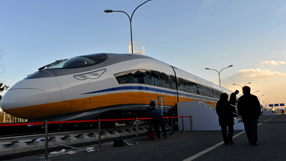
Jetlag, though, could be a consideration for players going to Yekaterinburg, located at the foot of the Ural mountains near the Europe-Asia border some 1,800 kilometres from Moscow, one football doctor has warned.
When Russia won the right to host the World Cup some critics said that long-distance travel within the world's largest country could be tiring for the players and costly for the fans.
Yekaterinburg is one of 13 proposed host cities. If it is included in the final plan, which must be approved by football's world governing body FIFA, fans could be travelling distances of more than 3,000 kilometres from the Baltic exclave of Kaliningrad to this most easterly location.
Yekaterinburg regional governor Alexander Misharin, however, was quick to dispel concerns about the distances.
"For the fans, we can offer something special. They can take an overnight train and enjoy sightseeing the country in addition to football," he told Reuters in an interview. "And the best thing for them, it would be free of charge."
The Russian government has guaranteed free railway travel for all fans with valid tickets during the 2018 tournament.
It takes about 26 hours to travel by train from Moscow to Yekaterinburg but Russia plans to build high-speed railways by 2018 that would significantly reduce travel time.
The best features, fun and footballing quizzes, straight to your inbox every week.
"With high-speed trains it would take about seven to eight hours instead of 26," said Misharin, a former railway engineer who was appointed by Prime Minister Vladimir Putin last month to serve on the supervisory board of the World Cup.
TIME DIFFERENCE
Experts say jetlag and the time difference could affect players' performances. Yekaterinburg is two time zones east of Moscow, four ahead of central Europe and six ahead of Greenwich Mean Time (GMT).
"We've always prepared ourselves if we had to travel to places like (Pacific Ocean port city) Vladivostok," said Vyacheslav Beresnev, a doctor for local side Ural, who play in Russia's Division One (second tier).
"Jetlag could be a negative factor in the team's play unless you prepare yourself well in advance. Normally, players need at least five days to acclimatise themselves in a new environment."
Yekaterinburg officials point to the 1994 World Cup held in the United States, where fans also had to travel up to 3,000 kilometres, flying from New York to Los Angeles.
"Brazil (2014 World Cup hosts) is not a small country either, so to say that in Russia fans and players would suffer from long travels like never before is not true," Misharin said.
"In 2018, the teams would be travelling by plane anyway, so it should take them no more than just a couple of hours at most to fly here.
"It's just a perception that we're far away from Moscow, from central Russia," Misharin added. "We need to try to change such a perception.
"A flight to Moscow or St Petersburg takes just over two hours, about the same time it takes to fly from London to Lisbon or Rome for example."
 Join The Club
Join The Club





